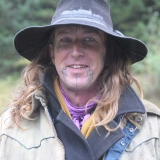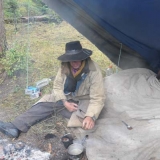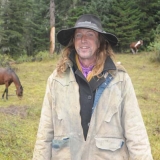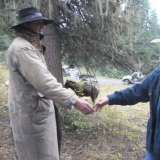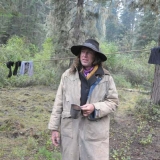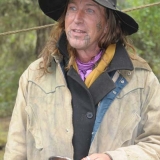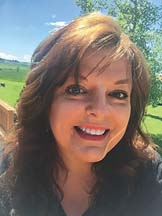No products in the cart.
Mountain Man
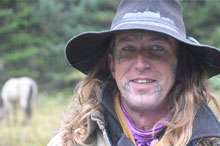
Encounter with a Rugged Individualist
Story and Photos by Lorie Palmer Russell
On a Tuesday last September, I got a call from Eldene Wasem in Grangeville. She thought I might be interested in writing a story on a man whom her nephew, Monty Spears of Harpster, had discovered setting up camp near their family cabins at McComas Meadows east of Grangeville in the Nez Perce National Forest.
Working as a reporter at the Idaho County Free Press for going on twenty years, I listen when Eldene calls. In her eighties, she is an active go-getter who knows the history of Idaho County like, well, the back of her hand.
Although I couldn’t make it up the mountain the day she called, I got hold of Monty, who, along with his wife, Brenda, owns an RV park, store, and bar at Harpster, which is thirteen miles northeast of Grangeville. I made arrangements to meet him at the store the next day. It was a rainy morning when I piled in with Monty and he drove me eight miles up the mountain outside Harpster to the old Adams Camp area of McComas Meadows. Monty knows the place well, his parents having met at Adams Camp. Years later, he and Brenda were married there.
John Hallam.
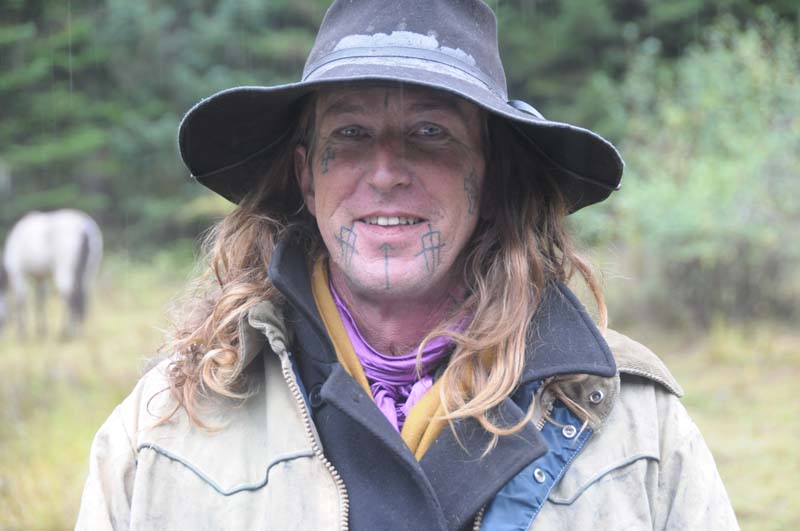
A lean-to protects John from the pouring rain.
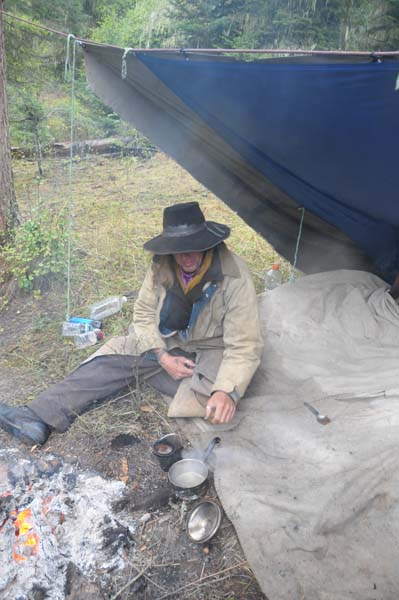
John with several of his horses at McComas Meadows.
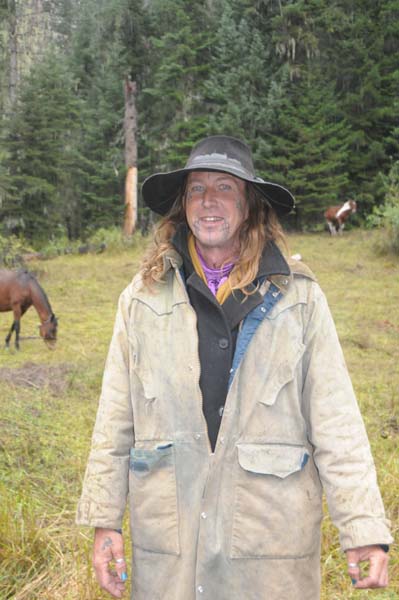
Monty Spears and John Hallam shake hands.
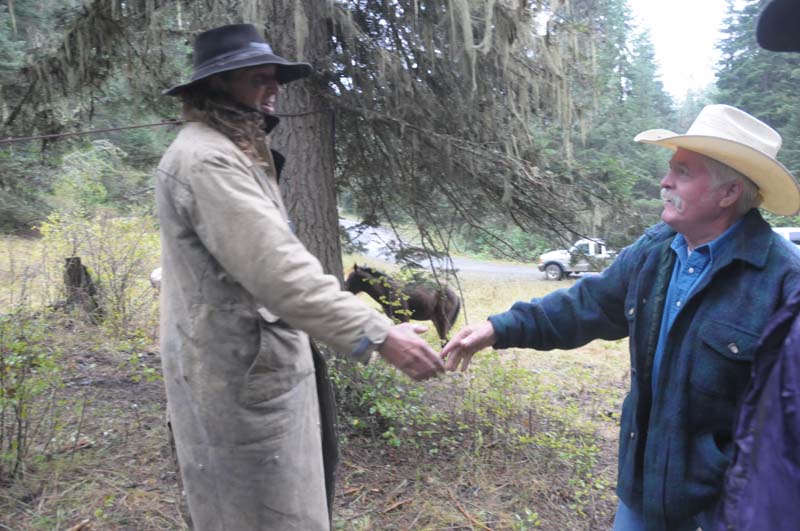
Morning coffee.
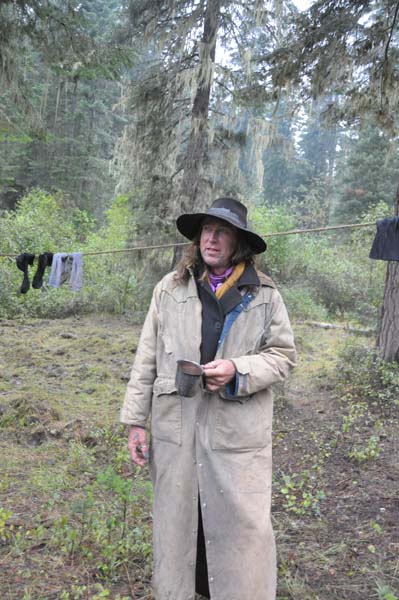
The tattoos on John's face represent crosses.
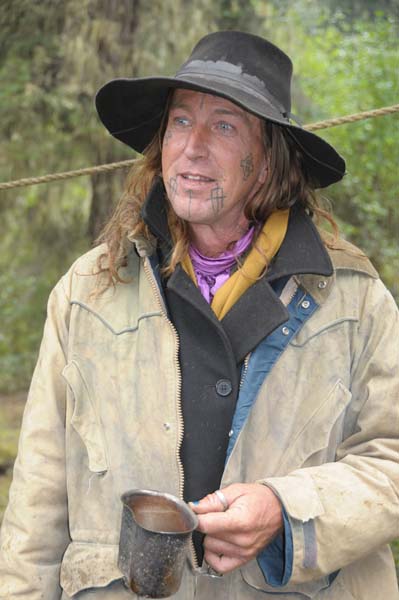
A former police officer and detective in Seattle and Lewiston, Monty has a practiced perspective on human character. “This man I’m taking you to meet seems like a nice guy—just different than your run-of-the-mill hunter or camper in the woods,” he told me.
Through winding roads bright with green in the rain and leaves starting to blast with fall color, we made our way to an opening just past the cabins, where Monty and his family have spent much time, as have Eldene and Harold Wasem. We spotted a truck owned by Gary Kinnick, who lives in Harpster and works part-time checking cattle for area rancher John Groom. It seems he also had discovered the camper when he was following the cows.
“I hope you don’t mind if I brought a lady reporter out to talk to you,” Monty called up a small, flat slope surrounded by trees. I looked up and, with Monty’s help, made my way across a slippery ditch and up a hill in the rain (keeping the pouring rain off my face with a baseball cap graciously loaned to my unprepared self by Monty). As I looked straight into the piercing blue eyes of a tall, weathered man, my thoughts raced. Who is this guy? What’s he doing here?
Scanning the area, I counted eight horses and saw a small lean-to covered with a tarp that housed two plastic totes. I noticed a pair of leather gloves with holes worn in the fingertips and a boot with a broken heel.
“Hi, I’m John Hallam. Nice to meet you.” The man smiled.
In all my years of reporting, I believe I’ve come to be blessed with a sense of calmness even in the midst of chaos, as well as the ability to discern a person’s true character. If eyes really are a window to the soul, then John Hallam’s soul is clear, bright, and kind. I felt this immediately as he looked at me and shook my hand.
“Do you mind if I finish making my coffee while we talk?” he asked, sitting on a saddle pad by his campfire to boil a small tin of water and pour it through grounds into a cup-sized strainer.
As Gary and Monty stepped aside to visit under a tree that provided shelter from the rain, I learned that John was a forty-seven-year-old nomad spending several nights at McComas Meadows, having most recently traveled from Weippe and on through the back country of small towns and into Kooskia. Severe rainstorms had caused him to take shelter in the meadows with his horses and few belongings.
Although many Idaho ranchers live the cowboy life throughout the year, I learned John lives the mountain man lifestyle minute by minute.
“I’ve been living in the mountains for the past seventeen years. I really cannot imagine any other way of life,” he said. “Sometimes people try to save me, both by baptism and physically wanting to take me in and out of the elements.” He grinned. “I don’t need saving.”
John fits into neither the stereotypical mountain man nor cowboy mold. His tanned, weathered hands sport blue-painted fingernails, rolling tobacco into homemade cigarettes. His long, wavy brown hair falls over a tattooed face. Crystal blue eyes twinkle with thoughtfulness before answering questions.
He said the life he had lived in the mountains for the past seventeen years was a far cry from his start in life. He grew up in Los Angeles, and by the age of nine was a ward of the state.
“I don’t think I was a bad kid, I was just hyperactive,” he said. “I did well on tests but I didn’t like to do the work and I didn’t like to sit still.”
In 1973, as part of a desegregation plan, he was picked in a lottery-style system to be bused to a school where he, as a Caucasian, was a minority. “It was just different — it was hard,” he said. “I didn’t seem to fit in anywhere.”
By age thirteen, he was alone on Hollywood Boulevard, growing up in the Eighties Punk Rock era. He was in and out of the California foster system until he was eighteen, after which he began to get jobs and travel, working for years as a trucker. “I remember in school a counselor asked me what I wanted to do — basically saying I wasn’t college material, so what else did I think I might do to earn a living. I told him I wanted to be a mountain man.”
That desire stayed with him, and in the mid-Nineties he struck out on the road, traveling the northwest states with as many as twenty-five horses at a time.
“I train and breed mustangs and am on the fifth generation now,” he said, pointing to two young foals traveling with him.
“I wouldn’t mind running into that counselor again so I could tell him it all worked out.” He smiled. “And also to tell him thank you for not trying to tell me this lifestyle would be impossible.”
Working at ranches and day jobs, John journeyed for years with his wife and son, now fifteen, who was born in the wilderness. He and his wife divorced about a year ago, and his son went to live with his maternal grandmother in Vancouver, Wash. “It’s hard. Definitely lonely at times,” he admitted. “Especially since I’ve been ill.”
He revealed he has a terminal illness, but wants to continue living the way he has for nearly the past two decades. “I was never one to want to go to work nine to five, pay taxes, sit down and die in one place,” he said. “I’m not a recluse, but this is just how I enjoy living—foraging, moving ahead.”
He said before he turned thirty he tried to reconcile with his birth parents. A hint of sadness crossed his face, and then he shook his head. “It just wasn’t meant to be,” he said softly.
One thing he misses because he is alone much of the time is conversation, he said.
“I might have people yell out to me, ‘What are you doing?’ when they see me somewhere. But it’s not very often I get to have real conversations, invest in dialogue and exchange, like now, with you. I think maybe I’ve said too much to you,” he laughed.
Money is not important to him, except for the necessary things he needs to live. Acquiring material items, unless he has specific need for them, is not what his life is about.
“I enjoy working and I enjoy the company of people.” Monty asked if John had any regrets about his lifestyle or if having a million dollars would change his direction at all.
“I don’t have any regrets. And if I had a million dollars? I’d build a sanctuary. I never had one myself. Everyone would be welcome. If I couldn’t share it, I wouldn’t want it.”
Gary, who was ready to get back out on the road, set down a large length of handmade lead rope on John’s bins. “That’s for you.”
“What? Are you sure?”
“A guy ordered that from me years ago and he never picked it up.” Gary shrugged. “This was kind of meant to be.”
Thanking him, John said he could really use it, because he had been tying pieces of rope together for tethering his horses.
The tattoos on his face, which all represent crosses, might cause people to be initially wary of this soft-spoken man. Explaining them, John runs his hands over his cheeks and lips.
“They all came from dreams I had back when I was in the punk rock scene, running around the boulevard with a blue mohawk. I feel they have bound my mouth, permitting me to only speak the truth.”
He set his frying pan over the campfire, even while admitting his illness had left him with little appetite. He was headed to Salmon River country for the winter, hoping to find some work.
He said he needs to shoe his horses and wouldn’t mind settling in a place for the winter to rest them and work. “I’m just out here, wherever you see me. I’m not hiding, I obey the rules of the land, and when I’m ready to move on, I try to leave things better than when I found them.”

